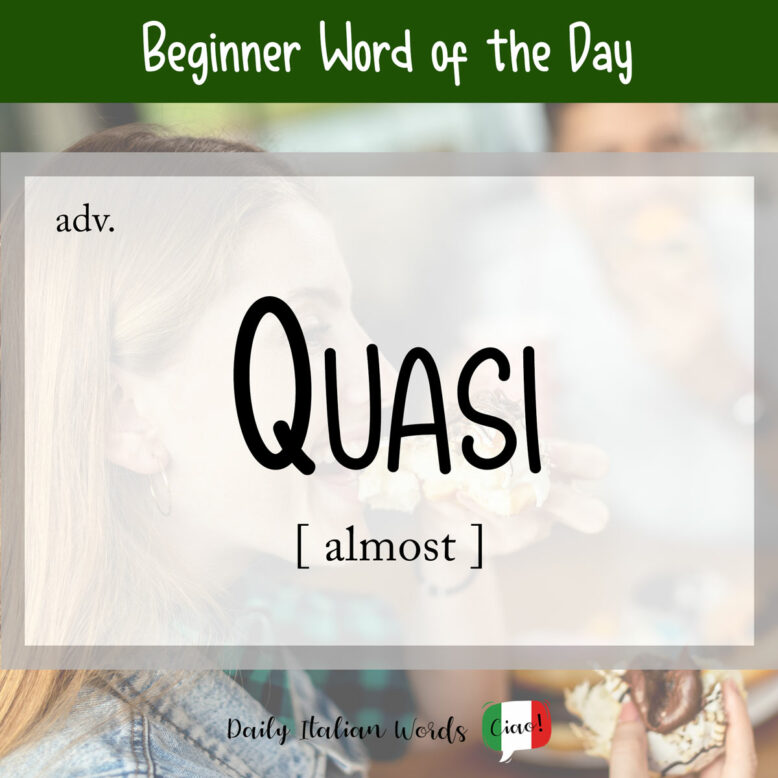A very useful Italian adverb is quasi which generally translates as almost or nearly in English. This word, as well as the English combining form quasi-, both derive from the Latin word of the same spelling meaning almost or as if.

It can modify nouns, adjectives and other adverbs. For example:
- quasi un’ora = almost an hour
- quasi vent’anni = almost twenty years old
- quasi tutti = almost everyone
- quasi vero = almost real
- quasi pronto = almost ready
- quasi sempre = almost always
- quasi sicuramente = almost surely
So quasi tutto su di voi.
I know almost everything about you guys.
Quasi can also modify verbs to mean almost, nearly or just about to.
- Stavo quasi per finire. = I was just about to finish.
- Ho quasi finito. = I’ve almost / nearly finished.
Questo mese ho letto talmente tanti libri che ho quasi perso il conto!
This month I’ve read so many books that I’ve almost lost count!

When paired with negative expressions, quasi may also translate as hardly / barely:
- quasi niente = hardly anything / almost nothing
- quasi nulla = hardly anything / almost nothing
- quasi nessuno = barely anyone / almost nobody
- quasi mai = hardly ever / almost never
In English, when we want to respond to something that angers or annoys us but do not actually plan to follow through, we tend to use the expression to have half a mind / a good mind (to do something). The equivalent expression in Italian is once again quasi or the more emphatic quasi quasi.
Quasi quasi vado a dirglielo!
I have half a mind to tell him!
Keep in mind that unlike English, quasi quasi doesn’t have to be used only in response to anger or annoyance. It can also be a way to announce or emphasises an intention that is still uncertain.
Quasi quasi stasera vado al cinema.
I might go to the cinema tonight.
Quasi also functions as a solitary response to a question as in the following example:
Hai finito il lavoro? – Quasi.
Have you finished the job? – Almost.

There are a couple of translations for quasi which have nothing to do with the word almost, one of which is perhaps / maybe.
Sta smettendo di piovere. Potremmo quasi uscire, che dici?
The rain is easing up. Perhaps we can go out, what do you say?
Likewise, when followed by a verb in its subjunctive or past participle form, quasi becomes a synonym for come se (as if).
Fu allora, quasi spinto da un’intuizione, che decise di agire.
It was then, as if driven by intuition, that he decided to act.
Heather Broster is a graduate with honours in linguistics from the University of Western Ontario. She is an aspiring polyglot, proficient in English and Italian, as well as Japanese, Welsh, and French to varying degrees of fluency. Originally from Toronto, Heather has resided in various countries, notably Italy for a period of six years. Her primary focus lies in the fields of language acquisition, education, and bilingual instruction.


